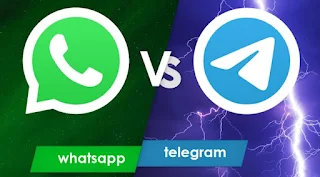In today's digital age, messaging platforms have become indispensable tools for communication, both on a personal and professional level. WhatsApp and Telegram are two prominent players in this arena, each offering a plethora of features and functionalities. Deciding which platform is superior depends on various factors, including security, user experience, features, and privacy.
WhatsApp, acquired by Facebook in 2014, boasts over two billion active users worldwide, making it one of the most widely used messaging platforms globally. It offers end-to-end encryption, ensuring that messages, calls, and media exchanged between users remain secure and private. The platform is renowned for its user-friendly interface, seamless integration with contacts, and widespread adoption.
One of WhatsApp's strengths lies in its simplicity and accessibility. It provides essential messaging features such as text, voice messages, voice and video calls, as well as file sharing. Additionally, WhatsApp's status feature allows users to share updates in the form of photos, videos, or text with their contacts.
However, WhatsApp has faced criticism regarding privacy concerns, particularly after updates to its privacy policy sparked controversy. Moreover, the platform lacks certain advanced features compared to Telegram, such as the ability to create channels for broadcasting messages to a large audience.
Telegram
Telegram, founded by Pavel Durov in 2013, positions itself as a privacy-focused messaging platform with a strong emphasis on security and customization. While it may not boast the same user base as WhatsApp, Telegram has garnered a dedicated following due to its robust security features and innovative functionalities.
Telegram offers end-to-end encryption in its secret chats, providing users with an additional layer of privacy for sensitive conversations. It also allows users to create channels, groups, and bots, enabling seamless communication and content sharing within communities. Telegram's file-sharing capabilities are noteworthy, allowing users to send large files and media without compression.
One of Telegram's standout features is its extensive customization options. Users can personalize their chat backgrounds, create custom stickers, and even develop their bots using the Telegram Bot API. Additionally, Telegram's cloud-based architecture ensures that messages are accessible across multiple devices, including smartphones, tablets, and desktops.
Conclusion
In the WhatsApp vs. Telegram debate, the ideal messaging platform ultimately depends on individual preferences and priorities. WhatsApp excels in simplicity, widespread adoption, and seamless integration with contacts, making it an excellent choice for everyday communication. On the other hand, Telegram shines in terms of security, customization, and advanced features, catering to users who prioritize privacy and flexibility.
Ultimately, both WhatsApp and Telegram have their strengths and weaknesses, and the decision boils down to what matters most to the user: convenience, security, features, or privacy. Regardless of the choice, both platforms serve as indispensable tools for staying connected in today's interconnected world.

